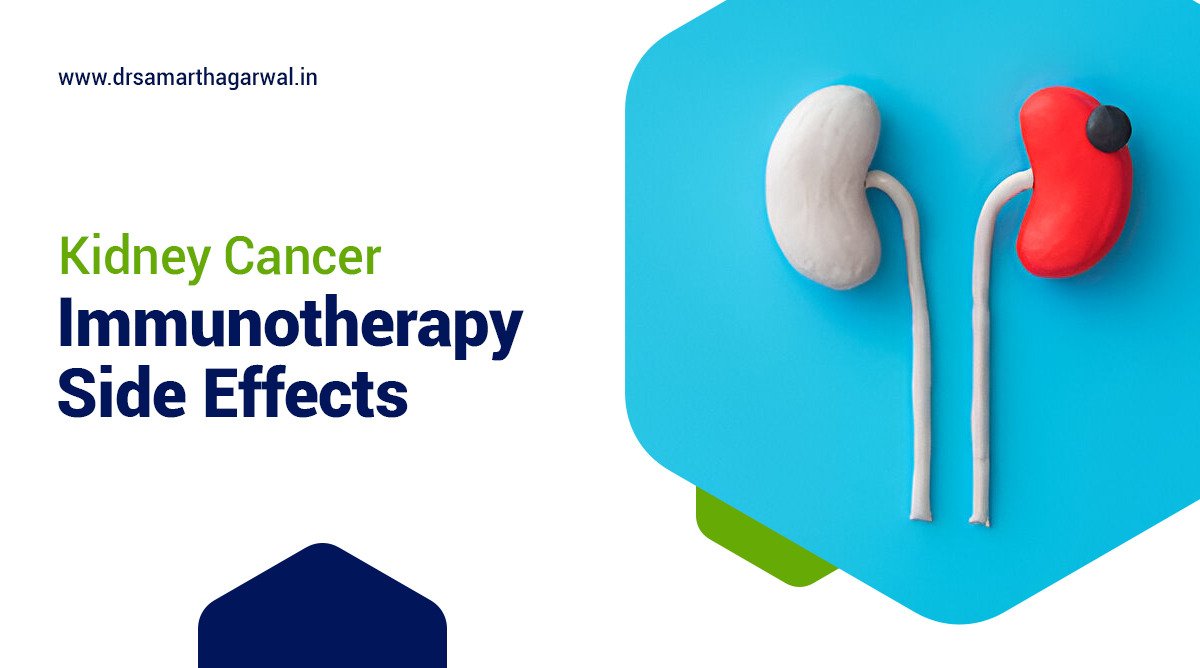Kidney cancer immunotherapy is a type of cancer treatment that uses the body’s immune system to fight cancer cells. It works by boosting the immune system’s ability to recognize and attack cancer cells, and has been shown to be effective in treating certain types of kidney cancer.
The concept of immunotherapy for kidney cancer is not new, but its application has evolved significantly in recent years. Immunotherapy for kidney cancer can be categorized into various types, each targeting different molecular mechanisms. For instance, PD-1 and PD-L1 inhibitors have been used to block the interaction between cancer cells and the immune system, thereby preventing cancer growth and metastasis.
Immunotherapy has shown promising results in treating kidney cancer, but like any other cancer treatment, it also comes with its own set of side effects. The symptoms, causes, and effects of these side effects will be discussed in the following sections.
The symptoms of kidney cancer immunotherapy side effects can vary from mild to severe and include fatigue, shortness of breath, nausea, vomiting, diarrhea, skin rash, itching, and joint pain. These symptoms can affect a person’s quality of life and may require medical attention to manage and alleviate.
The causes of kidney cancer immunotherapy side effects can be attributed to the body’s response to the treatment, including the activation of immune cells, inflammation, and cell death. The effects of these side effects can be severe, including organ damage, decreased life expectancy, and reduced quality of life.
Kidney cancer immunotherapy side effects are associated with the occurrence of adverse reactions, often mimicking autoimmune diseases, and have been best documented in patients with renal cell carcinoma.
According to Fiala, O, Šorejs, O, Šustr, J, & Fínek, J.’s 2020 study “Side Effects and Efficacy of Immunotherapy”, the association between immunotherapy side effects and efficacy has been identified in various studies, particularly in patients with malignant melanoma, non-small cell lung cancer, and renal cell carcinoma.
Common Side Effects of Kidney Cancer Immunotherapy
Kidney cancer immunotherapy is a treatment approach that harnesses the body’s immune system to fight cancer. While it can be effective, patients may experience a range of common side effects as a result of the immune system’s activation. Understanding these side effects is crucial for managing them effectively and maintaining quality of life during treatment.
Immune-Related Side Effects
Immunotherapy can lead to immune-related side effects due to the activation of the immune system, which may inadvertently target healthy tissues. This can result in inflammation in various organs, including the lungs, liver, and intestines. Symptoms can vary widely, from mild discomfort to severe complications, necessitating close monitoring and potential intervention.
Fatigue, Fever, and Muscle Aches
Many patients undergoing immunotherapy report significant fatigue, often described as overwhelming tiredness that does not improve with rest. Fever and muscle aches are also common, as the immune response can mimic flu-like symptoms. These effects can impact daily activities and overall well-being, requiring supportive care and management strategies.
Gastrointestinal Issues: Nausea, Diarrhea
Gastrointestinal side effects, such as nausea and diarrhea, are frequently experienced by patients receiving immunotherapy. These symptoms arise from the immune system’s effects on the digestive tract, leading to inflammation and discomfort. Managing these issues is essential to prevent dehydration and maintain nutritional intake.
Rashes and Itching
Skin reactions, including rashes and itching, are common side effects of immunotherapy. These can range from mild to severe and may require topical treatments or adjustments in therapy. In some cases, skin issues can lead to secondary infections if not properly managed, highlighting the importance of skin care during treatment.
Hormonal Changes
Immunotherapy can cause hormonal changes that affect various bodily functions. Patients may experience mood swings, changes in libido, or alterations in menstrual cycles. These hormonal fluctuations can be distressing and may require additional support or treatment to help manage symptoms.
Endocrine System Impacts
The endocrine system may be affected by immunotherapy, leading to conditions such as thyroiditis or adrenal insufficiency. These impacts can result in symptoms like fatigue, weight changes, and alterations in blood pressure, necessitating regular monitoring and potential treatment adjustments.
Neurological Effects
Some patients may experience neurological side effects, including headaches, dizziness, or peripheral neuropathy, which is characterized by tingling or numbness in the extremities. These symptoms can vary in severity and may require further evaluation to determine the appropriate course of action.
Respiratory Issues
Respiratory side effects, such as cough, wheezing, or difficulty breathing, can occur due to inflammation in the lungs, known as pneumonitis. These symptoms can be serious and require prompt medical attention to prevent complications.
Infusion Reactions
During or shortly after the administration of immunotherapy, some patients may experience infusion reactions, which can include fever, chills, rash, or difficulty breathing. These reactions may necessitate immediate medical intervention and monitoring to ensure patient safety.
Changes in Liver Function
Immunotherapy can lead to changes in liver function, often indicated by elevated liver enzymes. Symptoms may include jaundice (yellowing of the skin and eyes) and dark urine. Regular monitoring of liver function is essential to detect and manage any potential liver-related issues.
Increased Risk of Infections
Due to the modulation of the immune system, patients undergoing immunotherapy may have an increased risk of infections, including respiratory and urinary tract infections. This necessitates vigilant monitoring and preventive measures to protect patients during their treatment journey.
Serious Side Effects and Risks of kidney cancer immunotherapy
These serious side effects arise from the immune system’s heightened activity, which can lead to unintended consequences affecting various organs and systems in the body.
According to Roy Arya Mariam et al.’s 2023 study ‘Management of immune-mediated toxicities and their implications in the outcomes of advanced kidney cancer’, immune checkpoint inhibitors are a type of cancer treatment that boost the body’s immune system to fight against cancer, increasing the survival of kidney cancer patients (Roy, Arya Mariam, & George, 2023).
Targeted immunotherapy, such as immune checkpoint inhibitors, can have various side effects that can affect any organ in the body, including the heart, lungs, skin, bowel, and thyroid, which may be managed with immunosuppressants or steroids (Roy, Arya Mariam, & George, 2023).
Here are other severe Side Effects and Risks of kidney cancer immunotherapy:
- Severe Immune-Related Reactions
- Pneumonitis
- Colitis
- Hepatitis
- Endocrine Disorders (e.g., adrenal insufficiency, thyroiditis)
- Severe Skin Reactions
- Neurological Effects (e.g., encephalitis)
- Infusion Reactions
- Liver Dysfunction
- Increased Risk of Infections
- Organ Damage or Failure
Severe immune-related reactions can manifest as inflammation in multiple organs, leading to conditions such as pneumonitis (lung inflammation), colitis (inflammation of the colon), and hepatitis (liver inflammation). Endocrine disorders, including adrenal insufficiency and thyroiditis, may disrupt hormonal balance, while severe skin reactions can result in rashes or dermatitis. Neurological effects, such as encephalitis, can cause significant cognitive and physical symptoms.
Patients may also experience infusion reactions during treatment, which can range from mild to severe. Liver dysfunction is another concern, as immunotherapy can elevate liver enzymes and lead to jaundice.
Additionally, the immunosuppressive nature of treatment increases the risk of infections, and in severe cases, there is a potential for organ damage or failure, underscoring the need for careful monitoring and management throughout the treatment process.
Monitoring and Managing Side Effects of Kidney Cancer Immunotherapy
Effective monitoring and management of side effects are crucial for patients undergoing kidney cancer immunotherapy.
Importance of Regular Monitoring
Regular monitoring is vital to identify side effects early, preventing complications and ensuring timely interventions. This involves frequent check-ins with healthcare providers, laboratory tests, and physical examinations. Early detection can lead to more effective management strategies and improved patient outcomes.
Strategies for Managing Side Effects
Strategies for managing side effects include medication adjustments, supportive care, and lifestyle modifications. Healthcare providers work closely with patients to develop personalized plans to alleviate symptoms and improve quality of life. This may involve the use of anti-nausea medications, pain relief options, or dietary changes tailored to individual needs.
Role of Clinical Trials
Clinical trials play a significant role in advancing kidney cancer immunotherapy, offering innovative treatments and improving side effect management. Patients may have access to cutting-edge therapies and contribute to the development of new treatments. Participation in trials can also provide additional monitoring and support from research teams.
Patient Education and Awareness
Patient education and awareness are essential for effective side effect management. Empowered patients can recognize early warning signs, communicate effectively with healthcare providers, and make informed decisions about their care. Educational resources, workshops, and support groups can enhance patients’ understanding of their treatment journey.
Multidisciplinary Care Approach
A multidisciplinary care approach involves a team of healthcare professionals working together to address patients’ physical, emotional, and psychological needs. This collaborative approach ensures comprehensive support and optimal side effect management. Team members may include oncologists, nurses, dietitians, and mental health professionals, all contributing their expertise.
Long-term Follow-up and Surveillance
Long-term follow-up and surveillance are critical for monitoring side effects, detecting recurrences, and adjusting treatment plans as needed. Regular check-ins and testing ensure patients receive timely interventions and supportive care. This ongoing relationship with healthcare providers fosters trust and encourages adherence to follow-up schedules.
Use of Technology in Monitoring
Technology, such as mobile apps and telemedicine, enhances monitoring and communication between patients and healthcare providers. Digital tools facilitate real-time symptom reporting, enabling swift interventions and improving side effect management. These technologies can also provide reminders for medication and appointments, promoting adherence to treatment plans.
Quality of Life Considerations
Quality of life considerations are integral to side effect management. Healthcare providers prioritize patients’ physical, emotional, and social well-being, ensuring that treatment plans align with their values and goals. Assessing quality of life can help tailor interventions that address specific concerns, such as fatigue, anxiety, or social isolation.
Supportive Care Services
Supportive care services, including counseling, nutrition guidance, and pain management, complement immunotherapy and enhance patients’ overall experience. These services address the broader needs of patients, promoting holistic well-being. Access to palliative care can also improve symptom management and support patients’ emotional health.
Guidelines and Protocols
Guidelines and protocols standardize care, ensuring that patients receive evidence-based treatments and consistent support. Healthcare providers follow established frameworks to manage side effects, adapting them to individual patient needs. These guidelines are regularly updated based on the latest research, ensuring that care remains current and effective.
What is the Role of Immunotherapy in Treating Kidney Cancer?
Immunotherapy plays a crucial role in treating kidney cancer, particularly metastatic renal cell carcinoma. Immunotherapy utilizes the patient’s immune system to target and destroy cancer cells. This approach has significantly improved treatment outcomes and survival rates for patients with advanced kidney cancer. Checkpoint inhibitors like PD-1/PD-L1 and CTLA-4 are central to current immunotherapy regimens. FDA-approved immunotherapies include nivolumab, pembrolizumab, and ipilimumab, which can be used alone or in combination with other treatments.
The effectiveness of immunotherapy in kidney cancer treatment is evident through various clinical trials and research. For instance, a study published by the National Institutes of Health highlights the success of nivolumab and ipilimumab in treating metastatic renal cell carcinoma. These drugs, as immune checkpoint inhibitors, block proteins that prevent T cells from attacking cancer cells, thereby enhancing the immune response against tumors.
Immunotherapy has not only improved survival rates but also the quality of life for many patients. According to the Cancer Research Institute, immunotherapy has changed the treatment landscape for metastatic kidney cancer, offering hope to patients who previously had limited options. The combination of checkpoint inhibitors has shown to be particularly effective, with clinical trials demonstrating significant tumor shrinkage and prolonged remission periods.
However, the response to immunotherapy can vary among patients. Factors such as the stage of cancer, overall health, and specific genetic markers can influence treatment outcomes. Side effects, including fatigue, rash, and gastrointestinal issues, are common but manageable with proper medical support. Overall, immunotherapy represents a promising and evolving field in the fight against kidney cancer, offering a beacon of hope for patients with advanced stages of the disease.
Why Consider Immunotherapy for Kidney Cancer?
Immunotherapy boosts the body’s immune system to more effectively fight or destroy kidney cancer cells. It has significantly changed the treatment landscape and improved the overall survival rates for patients with metastatic kidney cancer. Immunotherapy can slow disease progression and shrink tumors. It is most commonly used for advanced or metastatic kidney cancer, showing higher efficacy in combination therapies compared to monotherapies.
Types of Immunotherapy Used for Kidney Cancer
Immunotherapy is a promising treatment approach for kidney cancer. This article highlights the various types of immunotherapy used to treat kidney cancer, including immune checkpoint inhibitors, cytokines, and combination therapies. Understanding these treatment options can help patients and healthcare providers make informed decisions about kidney cancer care.
- Several types of immune checkpoint inhibitors are available:
- CTLA-4 inhibitors: These include ipilimumab (Yervoy) used to block CTLA-4 proteins to help your immune system fight off abnormal cells.
- PD-1 inhibitors: These include Opdivo and Keytruda, which may help slow the growth of kidney cancer cells and expose tumor cells to immune system targeting and cell death.
- PD-L1 inhibitors: Examples include avelumab (Bavencio) used to block PD-L1 protein and help your immune system shrink cancerous growths.
- Cytokines can also be used:
- Interleukin-2 (IL-2) cytokines: These are high-dose cancer treatments given via IV, but are typically used only in advanced kidney cancer, as they come with a high risk of side effects.
- Interferon-alfa cytokines: These are another type of cytokine treatment that may be an alternative to IL-2, but may not be effective in treating kidney cancer alone.
- Combination therapies are also used:
- PD-L1 inhibitor combination therapies: Specifically, avelumab and axitinib (Inlyta) may be considered for stage 4 kidney cancer.
- PD-1 inhibitor combination therapies: For example, nivolumab used with cabozantinib (Cabometyx) may be considered for advanced kidney cancer.

Contact Dr. Samarth Agarwal for managing side effects of kidney cancer immunotherapy!






